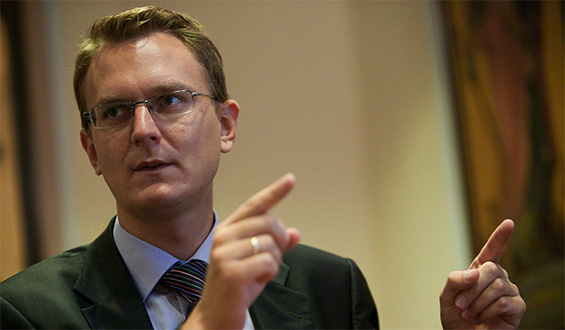 (Photo: Tuba Zoltán, Origo)
(Photo: Tuba Zoltán, Origo)
Bence Rétvári, the state secretary of the Hungarian Ministry of Human Capacities, officially announced that the central authority that has been overseeing the local schools since 2013 will be terminated. The news comes after months of teachers’ protests and strong international criticism.
In an interview with the local commercial TV channel ATV, cited by Christian Keszthelyi of the Budapest Business Journal, the state secretary admitted the government accepted the public criticism and it would improve its policy in the field of education. He also confirmed the authority known as KLIK would cease to exist this summer.
The government will draft new regulations and upon their acceptance during the spring sessions of Parliament, a brand new educational system will start functioning by the beginning of the academic year in September. The new system will be less centralized and will decrease the workload for teachers, writes Zoltan Simon for Bloomberg. The state secretary confirmed the number of compulsory classes per week will be lowered, the national curriculum will be reconsidered, and the volume of the required lexical knowledge to be taught would be decreased.
As far as the primary schools are concerned, the focus will be on the development of basic skills. By the end of 2017, the curriculum will be changed following the new reforms, concluded Rétvári.
Peter Kreko, a political analyst at Political Capital in Budapest, commented that the government was supposed to deliver an immediate response to the public pressure. However, he doubted the change would be significant, since centralization has always been a hallmark of Prime Minister Orban’s rule in all areas from education to healthcare:
“One can’t expect meaningful decentralization because the aim of the government has been to centralize and gain tighter control over what students are taught, including by reducing teachers’ autonomy over which textbooks they can choose to teach from.”
Established by Viktor Orban in 2013, KLIK was supposed to deal with the issues the Hungarian education system that Viktor Orban and politicians of the ruling Fidesz party said was in a “disastrous” condition when they came into power in 2010. As a result, KLIK started regulating all aspects of Hungarian education, including schools finances, curriculum, choice of textbooks, and decisions down to purchasing chalk for elementary schools, writes Gergely Szakacs of Reuters.
Teachers have complained about increased working hours, decreased wages, unwieldy curricula full of unnecessary classes, and more. According to educators, the focus of teaching was not analytical thinking, but on memorization. They also said their choice of textbooks was limited to a small number of government-approved selections. Many of the books contained factual errors and promoted the conservative government’s views on many areas of life, including homosexuality.
In November of last year, the Herman Otto High School in the city of Miskolc sent an open letter to the government in Budapest to complain about excessive centralization, underpaid teachers and overburdened students. More than 35,000 people supported the teachers by signing an online petition.
Since early February of 2016, teachers, parents and students have been protesting against the country’s centralization of education. Last week, over 10,000 Hungarians gathered in front of the House of Parliament for their third rally against the reforms.




